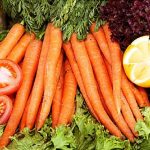 Naturally-occurring retinol (vitamin A) precursor obtained from certain fruits and vegetables with potential antineoplastic and chemopreventive activities. As an antioxidant, beta carotene inhibits free-radical damage to DNA. This agent also induces cell differentiation and apoptosis of some tumour cell types, particularly in early stages of tumorigenesis, and enhances immune system activity by stimulating the release of natural killer cells, lymphocytes, and monocytes.
Naturally-occurring retinol (vitamin A) precursor obtained from certain fruits and vegetables with potential antineoplastic and chemopreventive activities. As an antioxidant, beta carotene inhibits free-radical damage to DNA. This agent also induces cell differentiation and apoptosis of some tumour cell types, particularly in early stages of tumorigenesis, and enhances immune system activity by stimulating the release of natural killer cells, lymphocytes, and monocytes.
A type of carotenoid.
Optional on nutrition label unless added as a nutrient supplement. Beta-carotene converts to Vitamin A.
A phytochemical (vitamin precursor) that is naturally produced in the endosperm portion of the corn (maize) kernel. If the kernel seed coat is torn (e.g., via insect chewing), the beta carotene inhibits growth of Aspergillus flavus fungi in the endosperm region of the kernel.
An orange plant pigment that is converted in the body to vitamin A.
A nutrient that the body converts to vitamin A. One of a family of nutrients called carotenoids, beta carotene is found in orange and yellow fruits and vegetables, such as cantaloupe and carrots, and in green leafy vegetables such as broccoli and spinach. Acting as an antioxidant, beta carotene may protect against some forms of cancer.
A carotenoid pigment found in dark green and orange fruits and vegetables. In the body, beta-carotene is converted to vitamin A and is an important antioxidant.
Beta-carotene is among a group of pigments known as carotenoids and is a major source and precursor of vitamin A. Carotenes are colored pigments found in yellow and green vegetables. Many carotenes, including beta-carotene, are chain-breaking antioxidants and singlet oxygen quenchers. Thus, beta-carotene functions as one of the many antioxidants in the human body that are considered to inhibit the oxidative modification of low-density lipoproteins, inhibiting the atherosclerotic process and the subsequent progression of coronary heart disease. However, the belief that antioxidant supplements can prevent heart disease has not been proven by clinical evidence.
A substance found in plants that is converted to vitamin A by the intestines, lungs, and liver.
A yellow-orange pigment found in fruits and vegetables; it is the most common precursor of vitamin A. The daily human requirement for vitamin A can be met by dietary intake of beta carotene.
Beta-carotene is a plant substance that the body uses to make vitamin A, an antioxidant that helps prevent cellular damage from free radicals.
A pre-vitamin A compound found in plants that the body converts to vitamin A.
A carotenoid, known as a provitamin A, is present in dark green and yellow fruits as well as vegetables. It possesses only one-twelfth of the vitamin A activity found in retinol.
